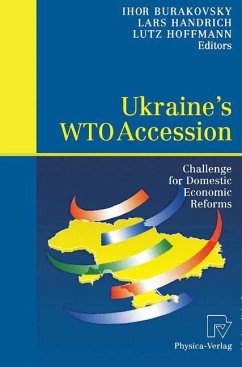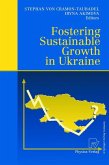This book addresses the domestic and economic policy challenges and opportunities that Ukraine faces in light of accession to the World Trade Organization (WTO). The country is politically committed to becoming a member. Experienced policy makers, international experts and scientists present their views on the country's path towards WTO membership. The contributors draw conclusions from previous accessions to WTO and discuss important aspects of institution building and the implementation of regulatory rules and their costs. Further, they argue that the country, which has an extremely high export-to-GDP ratio of over 60% (almost twice as high as Germany), needs to develop a coherent and WTO-compatible national trade policy. As the analysis shows, trade related policies are highly affected by WTO membership and Ukrainian competition and agricultural policies will need to become more market economy oriented. Still further, the text demonstrates that Ukraine is not likely to enjoy the full benefits of membership unless it pursues market oriented structural reforms.
Lars Handrich German Advisory Group on Economic Reforms with the Ukrainian Government 1 Ukraine on the way to WTO membership The first announcements by Ukraine to join the World Trade Organisation (WTO) were made in 1993. In the following year the Working group on Ukraine's accession was established. But successive Ukrainian governments had to sideline the issue of WTO accession, as the country went through a decade of unprecedented and severe economic decline. Only in the year 2000 the Ukrainian economy started to achieve positive real economic growth. Since then Ukraine embarked on a stable path of economic growth and continues to grow even under conditions ofa sluggish world economy and protectionist reflexes in some ofUkraine's export markets. According to the macroeconomic forecast of the Institute for Economic Research and Policy Consulting Ukrainian GDP will grow by 5,4% in 2003 in real terms and by 5,I% 1 in 2004. For Ukraine WTO accession is of special importance. Ukraine records an extremely high exports-to-GDP ratio of over 60% - almost twice the ratio for Germany.' The large ratio and the little diversified structure ofUkraine's imports and exports make Ukraine seriously vulnerable to external shocks resulting from changes in trade regimes. Joining the WTO, trade among WTO members amounting to more then 90% of world trade, could reduce the risks related to external trade and Ukraine could derive substantial economic and hence welfare benefits from the membership in WTO.
Hinweis: Dieser Artikel kann nur an eine deutsche Lieferadresse ausgeliefert werden.
Lars Handrich German Advisory Group on Economic Reforms with the Ukrainian Government 1 Ukraine on the way to WTO membership The first announcements by Ukraine to join the World Trade Organisation (WTO) were made in 1993. In the following year the Working group on Ukraine's accession was established. But successive Ukrainian governments had to sideline the issue of WTO accession, as the country went through a decade of unprecedented and severe economic decline. Only in the year 2000 the Ukrainian economy started to achieve positive real economic growth. Since then Ukraine embarked on a stable path of economic growth and continues to grow even under conditions ofa sluggish world economy and protectionist reflexes in some ofUkraine's export markets. According to the macroeconomic forecast of the Institute for Economic Research and Policy Consulting Ukrainian GDP will grow by 5,4% in 2003 in real terms and by 5,I% 1 in 2004. For Ukraine WTO accession is of special importance. Ukraine records an extremely high exports-to-GDP ratio of over 60% - almost twice the ratio for Germany.' The large ratio and the little diversified structure ofUkraine's imports and exports make Ukraine seriously vulnerable to external shocks resulting from changes in trade regimes. Joining the WTO, trade among WTO members amounting to more then 90% of world trade, could reduce the risks related to external trade and Ukraine could derive substantial economic and hence welfare benefits from the membership in WTO.
Hinweis: Dieser Artikel kann nur an eine deutsche Lieferadresse ausgeliefert werden.








